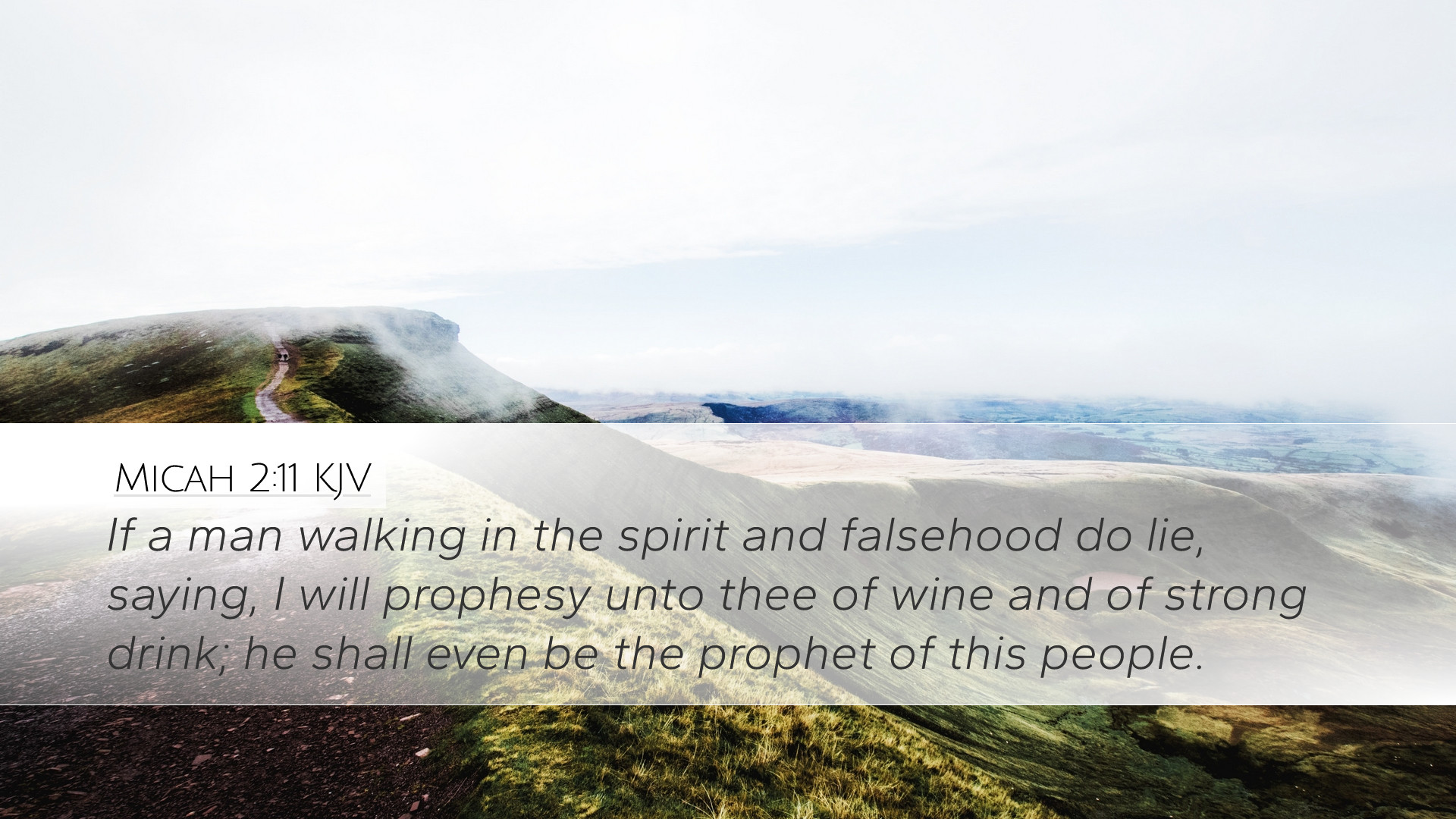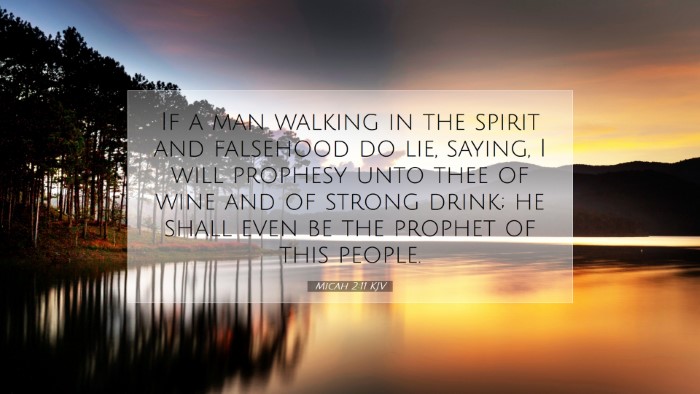Old Testament
Genesis Exodus Leviticus Numbers Deuteronomy Joshua Judges Ruth 1 Samuel 2 Samuel 1 Kings 2 Kings 1 Chronicles 2 Chronicles Ezra Nehemiah Esther Job Psalms Proverbs Ecclesiastes Song of Solomon Isaiah Jeremiah Lamentations Ezekiel Daniel Hosea Joel Amos Obadiah Jonah Micah Nahum Habakkuk Zephaniah Haggai Zechariah MalachiMicah 2:11
Micah 2:11 KJV
If a man walking in the spirit and falsehood do lie, saying, I will prophesy unto thee of wine and of strong drink; he shall even be the prophet of this people.
Micah 2:11 Bible Commentary
Commentary on Micah 2:11
Verse Text: "If a man walking in the spirit and falsehood do lie, saying, I will prophesy unto thee of wine and of strong drink; he shall even be the prophet of this people."
Introduction and Context
Micah, a prophet during the 8th century BC, delivers God's message of judgment and hope amidst the impending doom faced by Israel and Judah. The book addresses the moral and social decay of the people, particularly the leaders, who exploit the vulnerable and lead the nation into spiritual corruption. In this verse, Micah highlights the consequences of false prophecy and the allure of deceptive messages, particularly those that appeal to the flesh.
Analysis of Micah 2:11
False Prophecy
As noted by Matthew Henry, the 'man walking in the spirit and falsehood' epitomizes those who mix truth with deceit. This portrayal serves as a warning that some individuals may present themselves as prophets while leading the people into misunderstanding and false worship. They often do so by promoting messages that comfort rather than challenge.
Appeal to Sensuality
Micah points out this false prophet's willingness to offer prophecies that promise indulgence in 'wine and strong drink.' Albert Barnes draws attention to the fact that appealing to the desires of the people is a common tactic among false prophets. Rather than directing their followers to a deeper relationship with God, these prophets manipulate emotions and desires, leading people away from Biblical truth.
Judgment upon the People
Furthermore, Micah emphasizes that such a prophet will be the 'prophet of this people.' This insight, as highlighted by Adam Clarke, clarifies that those who embrace deceptive practices inevitably bring judgment upon themselves. The implication is that kissing popularity often leads to the neglect of divine principles; thus, the people who choose to follow such prophets become complicit in their own spiritual demise.
Theological Insights
- Divine Displeasure with Deception: God holds a severe disposition toward deceitful practices. This verse serves as a reminder of the gravity of misrepresentation of His Word.
- The Contrast of True and False Prophecy: The call for discernment is critical; true messengers of God do not shy away from the hard truths that lead to genuine repentance.
- Spiritual Leadership Accountability: Those in positions of spiritual authority are reminded of their responsibility to proclaim Biblical truth and to lead their followers towards holiness rather than comfort.
Personal and Pastoral Applications
For pastors and leaders, the message of Micah 2:11 serves as a profound reminder of the importance of integrity in ministry. There are significant pastoral responsibilities to be such shepherds who feed the flock with sound doctrine rather than populist, superficial messages.
This passage offers a critical examination for individuals studying theology. It invites scholars to delve deeply into the nature of prophecy and to discern how contemporary messages might align or diverge from Scriptural boundaries. One should regularly examine whether their teachings lead the congregation towards a deeper holiness or merely serve as a distraction of indulgence.
Conclusion
In conclusion, Micah 2:11 presents a striking warning against false prophecy and the seduction of messages that contain no substance. The narrative of Micah is not simply an ancient account but a living caution that continues to resonate within the church today. By heeding the warnings contained in this succinct yet profound verse, individuals and leaders alike can strive to foster a more genuine expression of faith that resists the allure of falsehood and seeks the transformative power of truth.


